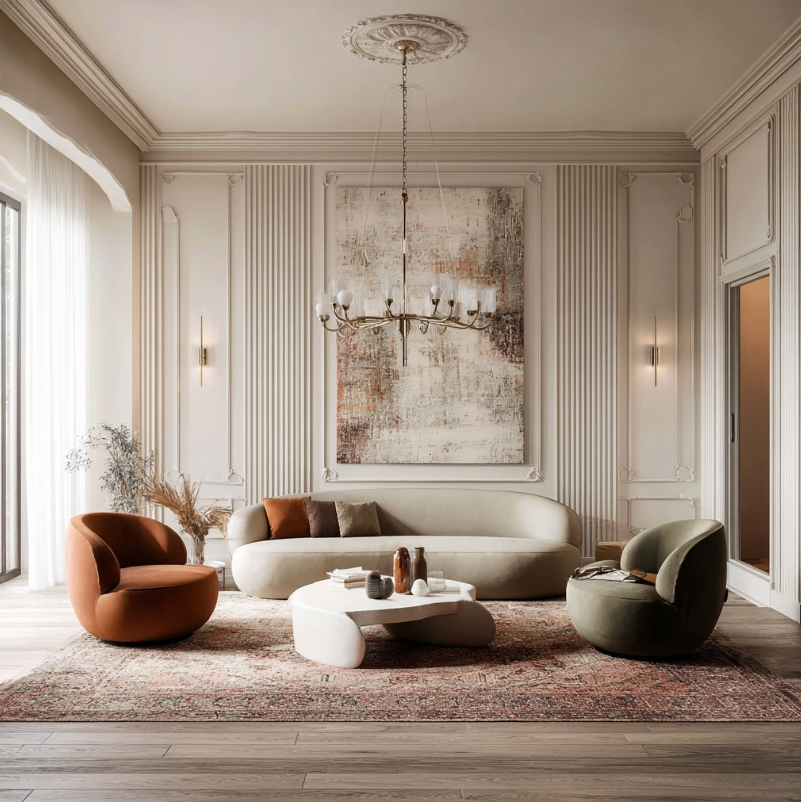What are the best materials for flooring/countertops/cabinets?
- Lillian Derevitsky
- Oct 22, 2023
- 4 min read
When it comes to remodeling your home or designing a new one, choosing the right materials for your flooring, countertops, and cabinets is crucial. These elements play a significant role in the functionality and aesthetics of your living space. To make informed decisions, it's essential to understand the best materials available for each of these components. In this blog, we'll explore the top materials for flooring, countertops, and cabinets, helping you make choices that best suit your needs and style.
Flooring Materials:
Hardwood: Hardwood flooring is timeless and adds warmth and character to any space. It's durable, long-lasting, and can be refinished to maintain its beauty over time. Popular hardwood options include oak, maple, and cherry.

Hardwood flooring can be expensive, both in terms of material and installation costs. Quality hardwood, especially exotic or rare wood species, can be particularly costly.
In summary, hardwood floors offer a classic and elegant look, but they do have some notable disadvantages, including susceptibility to moisture, maintenance requirements, and the potential for scratches and dents.
Laminate: Laminate flooring provides an affordable alternative to hardwood. It's durable, easy to clean, and comes in various styles that mimic the appearance of natural wood or stone.

Laminate flooring is not as durable as solid hardwood or natural stone. It can be more susceptible to dents, scratches, and damage from heavy impacts. While it has a wear layer designed to resist wear and tear, it's not as resilient as some other flooring options.
It can be vulnerable to water damage. Limited Repairability
Tile: Tile flooring offers endless design possibilities. It's available in ceramic, porcelain, and natural stone options. It's resistant to moisture and stains, making it an excellent choice for kitchens and bathrooms. Expensive to install. Ceramic is easy to break. Limited Repairability.

Vinyl: Vinyl is a cost-effective and water-resistant flooring material. It's available in various designs, including vinyl planks that resemble hardwood and vinyl tiles that mimic stone or ceramic. Disadvantages of vinyl: limited repairability, potential emissions, and issues with extreme temperature conditions.

Countertop Materials:
Granite: Granite is a natural stone known for its durability and luxurious appearance. It's heat-resistant, scratch-resistant, and available in a wide range of colors and patterns.

While granite countertops offer durability and a luxurious appearance, they come with potential disadvantages such as the cost, maintenance requirements, porosity, and limited design choices. It's important to consider these factors along with your specific needs and preferences when making a decision about countertop materials for your home.
Quartz: Engineered quartz countertops are non-porous and highly durable. They come in an array of colors and require minimal maintenance.

Disadvantages of Quartz including limited heat resistance, the engineered nature of the material, and potential fading in direct sunlight
Marble: Marble countertops are elegant and add a touch of sophistication to any kitchen. However, they are more susceptible to staining and require regular sealing.

Butcher Block: Butcher block countertops are made from hardwoods like maple or oak. They provide a warm and rustic look, but they need periodic maintenance to prevent damage.

Porcelain: Porcelain countertops are a durable, versatile, and low-maintenance option for kitchen and bathroom surfaces. They offer excellent resistance to stains, heat, and impact, and their wide range of design options make them a popular choice for modern and traditional settings.

Porcelain countertops offer many advantages. However, it's essential to consider the disadvantages, such as the potential for chipping, installation complexity, and cost.
Cabinet Materials:
Solid Wood: Solid wood cabinets, made from hardwoods like oak, cherry, or maple, are a classic choice. They are durable and can be refinished if needed.

Disadvantages include: Solid wood cabinets tend to be more expensive compared to other materials, which can impact your budget. Exposure to high humidity and moisture can lead to warping, cracking, or damage to solid wood cabinets.
Plywood: Plywood cabinets are a more affordable option, but they are still strong and durable. They are often used as the base material for cabinet boxes.

What is disadvantages of Plywood cabinets? Plywood cabinets may not have the same natural wood grain and warmth as solid wood, and some people prefer the look of real wood.
The appearance of plywood cabinets can vary, and they may not have the same uniformity as solid wood.
MDF (Medium-Density Fiberboard): MDF is an engineered, a cost-effective, wood product that's smooth and uniform. It's commonly used for cabinet doors and panels, offering a painted or laminated finish.
Disadvantages of MDF cabinets: Moisture Sensitivity: MDF is susceptible to moisture, so it's crucial to prevent exposure to water or high humidity. MDF cabinets are Not Suitable for Heavy Hardware: MDF may not hold heavy hardware or handles as securely as solid wood.
Laminate: Laminate cabinets are budget-friendly and easy to clean. They come in various colors and styles and are a popular choice for modern and minimalist designs.

Disadvantages: Laminate cabinets may not be as durable as other materials and can be more susceptible to damage from impact or heat. Laminate doesn't replicate the natural wood grain or warmth of real wood, which some homeowners prefer.
When choosing materials for your home, consider your budget, lifestyle, and design preferences. It's also crucial to balance aesthetics with functionality. Each material has its unique advantages and limitations, so weigh the pros and cons to find the perfect fit for your flooring, countertops, and cabinets.
Are you ready to transform your Home into something special and unsure where to start? Don't forget to consult with professionals in the industry to ensure your choices align with your specific needs and the overall design of your home. With the right materials, your home will not only look great but also stand the test of time. Call us today, and let's discuss how we can create the home of your dreams together!





Comments